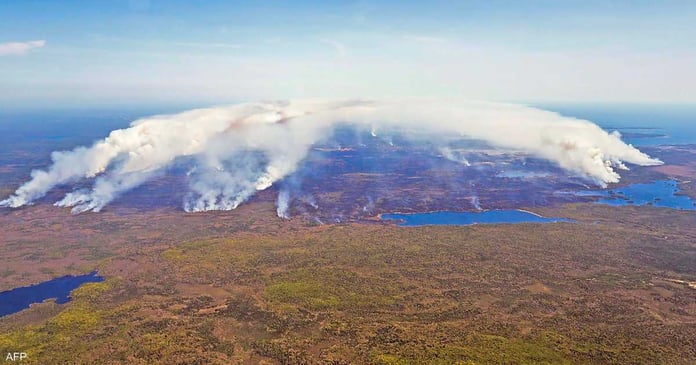The start of the fire season in Canada has been described as the worst start to any wildfire season, and the mayor of Quebec has declared a state of emergency in the city, and Quebec’s Minister of Public Safety , Francois Bonardelle, said he had contacted the federal government to ask for help from the military.
As part of international efforts to deal with the crisis, French President Emmanuel Macron announced that his country was ready to send aid and reinforcements to Canada, as the country was hit several weeks ago by massive and devastating fires, 361 of which are still burning.
Macron announced that 100 French firefighters and experts would be sent across the Atlantic, as fires have destroyed more than 2.7 million hectares since the start of this year in Canada, 8 times the average of the past 30 years, according to Canadian authorities.
Early warning is the solution
A member of the International Union for Conservation of the Environment, Ayman Qaddouri, explains in exclusive statements to “Sky News Arabia” the reasons for the ferocity of the wildfires this season, and reveals the hopes of the COP28 which will will be held in the UAE next November:
The early warning system helps to deal with natural disasters in general, as it is a monitoring system for climatic factors that can worsen and cause an environmental catastrophe. It will work to prevent the aggravation of any environmental catastrophe and to reduce material and human losses by allowing the time necessary for the evacuation of threatened areas, and by transferring people to shelters specially designed to deal with environmental risks. . Equip rapid response teams and develop the skills of civil protection teams to deal with the circumstances of the outbreak of the disaster, and how to control it to prevent its spread. This preparation will be ensured by the early warning system, which plays on the important time-saving factor to limit the disaster and avert its risks. We hope that this project will attract the attention of member states of the climate conference, especially during the upcoming COP28 summit to be held in the United Arab Emirates in November.
The reasons for the exacerbation of the crisis
International Federation member Ayman Qaddouri attributes the continued fires in Canada to the exposure of the west of the country during raging fires to high winds that helped spread flames to larger areas. The winds reversed their course to the east causing fires to spread through the eastern provinces of Canada, perhaps the most important of which is the province of Nova Scotia, and thus threatening tens of thousands of families living on farms adjacent to the burning forests whose fires have grown out of control. The drought that hit the whole country and lasted more than 4 years, the forest plants lost their water content and became organic fuel ready to ignite, as for the farms surrounding the villages of the province, the cultivated areas reduced and the lack of sufficient water resources to maintain the humidity of the agricultural land, so that it has now turned to ashes after the fire reached it. The extreme climatic effects that lead to the occurrence of the disaster are cumulative events, i.e. the occurrence of the disaster is preceded by periods of negative load during which the environmental factors resulting from the deterioration accumulate. climatic conditions. What has happened in Canada and the continued transmission of fires between the west and east of the country is an expected result of the drought that has helped the dry zone of the vast interconnected Canadian forests to exacerbate the fires.
Expect Huge Losses
According to the European Commission’s European Civil Protection and Humanitarian Aid Operations, the risk of fires is expected to increase due to climate change. The season will increasingly be marked by wildfires that are costing lives and burning areas that are taking longer to fully recover. Recently, forest fires have become a pan-European concern, although France, Spain and Portugal were particularly affected last summer, major fires also raged in the Czech Republic, Germany, Greece and Slovenia, to name a few. A total of 20 EU Member States recorded more burnt areas than average in 2022. The risk of wildfires has spread to previously unexposed areas and moved beyond the region Mediterranean. This leads to huge social, ecological, climatic and economic losses across Europe. The first months of 2023 follow the same pattern as the previous four years, with a very high number of winter and spring fires. The drought conditions already affecting Europe continue into 2022, with high fire risks expected during the summer, as temperatures are above average in most regions. from the continent.
Read the Latest World News Today on The Eastern Herald.


